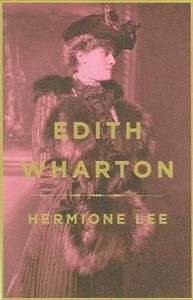
| Edith Wharton - Alfred A. Knopf, |
| Knopf (2007) |
| In Collection
#2688 |
| 0* |
| Biography |
| Woman |
|
Hardcover 0375400044
English |
|
|
||||||||||||||||||||||||||
|
|||||||||||||||||||||||||||
The definitive biography of one of America’s greatest writers, from the author of the acclaimed masterpiece Virginia Woolf.
Delving into heretofore untapped sources, Hermione Lee does away with the image of the snobbish bluestocking and gives us a new Edith Wharton—tough, startlingly modern, as brilliant and complex as her fiction.
Born in 1862, Wharton escaped the suffocating fate of the well-born female, traveled adventurously in Europe and eventually settled in France. After tentative beginnings, she developed a forceful literary professionalism and thrived in a luminous society that included Bernard Berenson, Aldous Huxley and most famously Henry James, who here emerges more as peer than as master. Wharton’s life was fed by nonliterary enthusiasms as well: her fabled houses and gardens, her heroic relief efforts during the Great War, the culture of the Old World, which she never tired of absorbing. Yet intimacy eluded her: unhappily married and childless, her one brush with passion came and went in midlife, an affair vividly, intimately recounted here.
With profound empathy and insight, Lee brilliantly interweaves Wharton’s life with the evolution of her writing, the full scope of which shows her far to be more daring than her stereotype as lapidarian chronicler of the Gilded Age. In its revelation of both the woman and the writer, Edith Wharton is a landmark biography.
Edith Wharton resided in France during World War I, visiting combat zones and hospitals and working tirelessly with refugee and children’s relief organizations. In magazines and newspapers such as the New York Times, Saturday Evening Post, and Scribner’s, she wrote prodigiously about the war--dispatches, feature articles, and poems. During this time she also completed a number of short stories, two books (Summer and The Marne), and the essays that were collected in French Ways and Their Meaning. The war remained a topic for her after its conclusion, most notably in her 1923 novel, A Son at the Front. Yet none of this work has received the critical attention it deserves. Julie Olin-Ammentorp, through her detailed examination of a wide range of texts, including archival sources and materials long out of print, reclaims Wharton’s war writings and places her in the company of other "Great War" writers.
Olin-Ammentorp integrates all of Wharton’s war-time literary genres, discusses common themes, and examines issues such as Wharton’s exclusion from the canon of Great War writers; the effect of the war on her choice of subject, style, and tone; her shifting perspective on the war itself, as it dragged on far longer than anyone anticipated; her sense of personal, social, and literary destabilization during the war; and her increased sense of the role of history during and after the war.
Olin-Ammentorp quotes many evocative passages from Wharton’s wartime correspondence--most notably to Henry James, who avidly read Wharton’s letters to him as if they were dispatches from the front. Particularly new is the inclusion of Wharton’s poetry composed during the war years, most of which has remained unpublished until now. In addition, Olin-Ammentorp’s examination of A Son at the Front is more detailed, comprehensive, and complex than any study to date. She concludes with a reflection on Wharton’s last depiction of the war years in her memoir, A Backward Glance.
In addition to providing a thorough analysis of Wharton’s war writings, the book includes two appendixes of her out-of-print and scattered writings, available for the first time in over 85 years. The first contains the war poetry; the second includes a sampling of Wharton’s war-related nonfiction prose, including newspaper reportage, magazine articles, an obituary for her young friend Ronald Simmons who died in the war, and a speech she gave to American servicemen.